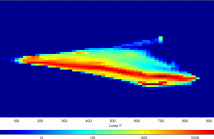- Read more about Jointly Optimized Transform Domain Temporal Prediction and Sub-pixel Interpolation
- Log in to post comments
Conventional pixel-domain block matching temporal (inter) prediction is suboptimal, since it ignores the underlying spatial correlation. Hence in our recent research we proposed transform domain temporal prediction (TDTP), wherein spatially de-correlated transform coefficients are individually predicted. Later we proposed extended block TDTP (EB-TDTP), which fully exploits spatial correlation around reference block boundaries. However, the transform domain temporal correlation exploited by (EB-)TDTP interferes with the frequency response of sub-pixel interpolation filters.
- Categories:
 3 Views
3 Views- Read more about Inter-Block Dependencies Consideration Applied to Intra Coding in H.264/AVC and HEVC standards
- Log in to post comments
Recent MPEG video compression standards are still block-based: blocks of pixels are sequentially coded using spatial or temporal prediction schemes. For each block, a vector of coding parameters has to be selected. In order to limit the complexity of this decision, independence between blocks is assumed, and coding parameters are locally optimized to maximize the coding efficiency. Few studies have investigated the benefits of inter-block dependencies consideration using Joint Rate-Distortion Optimization (JRDO), especially in Intra coding.
- Categories:
 8 Views
8 Views- Read more about IMPROVED ADVANCED MOTION VECTOR PREDICTION SCHEME FOR SURVEILLANCE VIDEO CODING
- Log in to post comments
- Categories:
 35 Views
35 Views- Read more about A Fast Intra-Prediction Decision Algorithm in Inter-Frame based on a Novel Feature of HEVC
- Log in to post comments
With the quad-tree based coding structure and more flexible intra-modes, the coding efficiency provided by intra-technique in inter-frames of HEVC is much higher than the preceding standard H.264/AVC. However, the computing complexity is also significantly increased. Although only a few CUs are encoded as intra-mode in inter-frames finally, almost all CUs need to be checked all the intra-options to obtain the optimal mode, which may be in fact unnecessary.
ICASSP2017_TT.pdf
- Categories:
 6 Views
6 Views- Read more about FAST HEVC INTRA CODING ALGORITHM BASED ON MACHINE LEARNING AND LAPLACIAN TRANSPARENT COMPOSITE MODEL
- Log in to post comments
- Categories:
 10 Views
10 Views
- Read more about Image Compression via Multiple Learned Geometric Dictionaries
- Log in to post comments
- Categories:
 3 Views
3 Views
- Read more about Image Compression via Multiple Learned Geometric Dictionaries
- Log in to post comments
- Categories:
 11 Views
11 Views- Read more about FAST INTRA MODE DECISION AND BLOCK MATCHING FOR HEVC SCREEN CONTENT COMPRESSION
- Log in to post comments
A fast intra mode decision scheme for HEVC screen content coding is proposed to reduce the complexity of intra mode decision search for each coding unit. A fast block matching scheme for intra block copy is proposed to reduce the number of blocks for 2-D search. 39% and 35% encoding time reduction for lossy and lossless encoding scenarios with negligible quality loss are achieved under the SCC common test condition.
- Categories:
 11 Views
11 Views- Read more about Adaptive Rate Control Algorithm for SHVC: Application to HD/UHD
- Log in to post comments
Scalable video coding consists in compressing the video sequence into a layered bitstream where each layer refers to different spatial, temporal or quality representation of the video. Scalability enables compression gain compared to the simulcast encoding of layers thanks to inter-layer predictions. The scalable HEVC extension (SHVC) is the latest scalable technology promising up to 30% bitrate gains under the common test conditions, defined by JCT-VC. These conditions do not consider UHD and use fixed quantization step, which is not relevant in operational environment.
- Categories:
 12 Views
12 Views
Color pixel encoding optimizes the conversion of linear physical values of light into integer values. The efficiency of such encoding methods depends on a trade-off between the bit-depth used and the visible distortion introduced by quantization. This efficiency for different color pixel encoding approaches has been evaluated in literature, without considering the fact that before transmission to the end-user, color encoded content needs to be compressed using a video codec.
- Categories:
 10 Views
10 Views